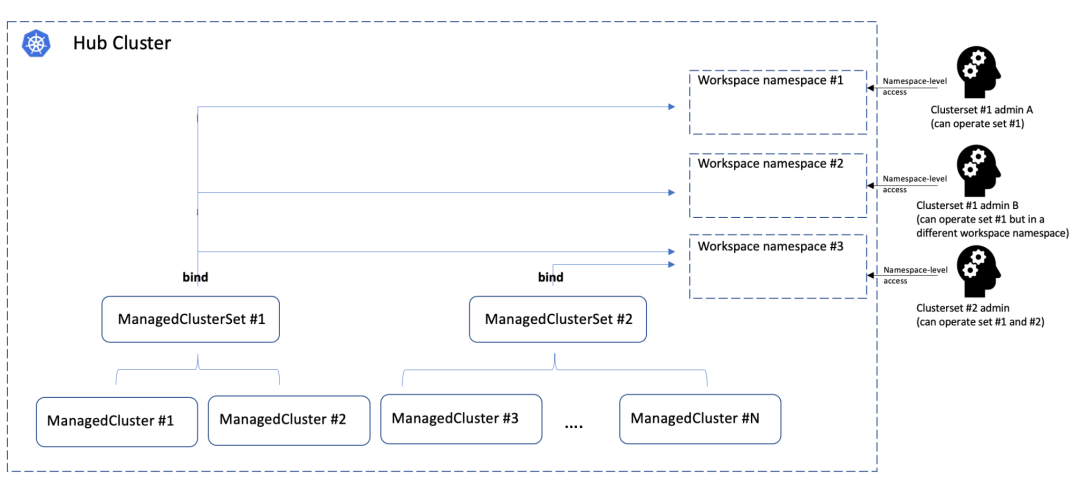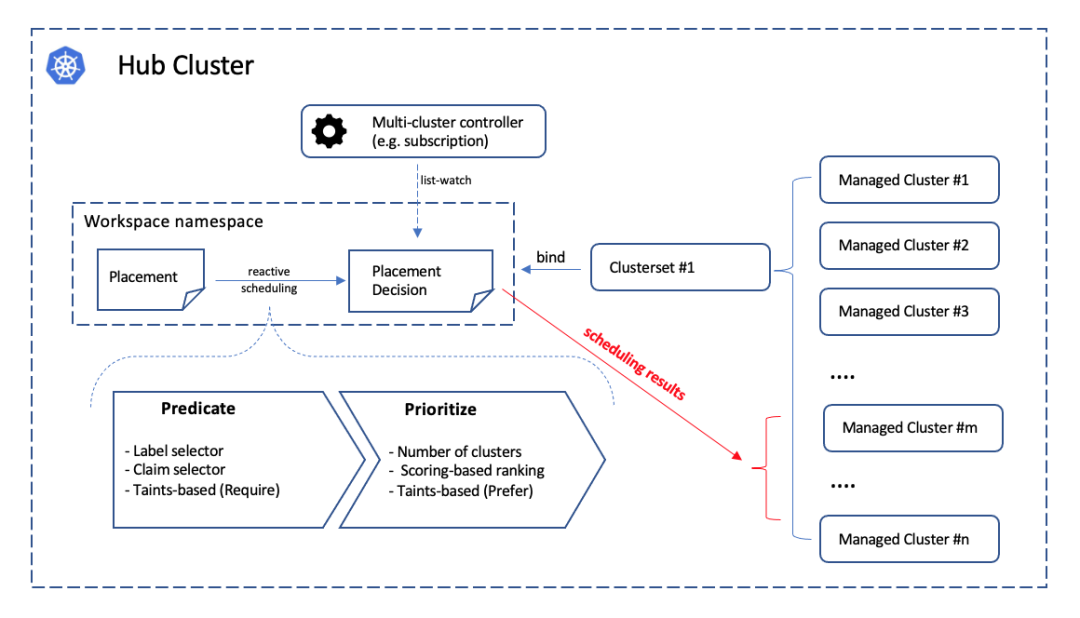By Zuo Xiu
The Open Cluster Management (OCM) community officially released v0.7.0 at the end of March. In this version, the community maintainer has solved some problems with the existing features and polished and improved the experience for end users. Newly logged-on users can refer to the document [1] to experience the new version. At the same time, users that have deployed v0.6.0 can refer to the document [2] to upgrade the existing environment.
The new version provides the "DefaultClusterSet" feature to enable users to log on to cross-cluster orchestration capabilities (such as Placement) of OCM smoothly. In old versions of OCM, users need to plan the ClusterSet topology of clusters in OCM in advance to experience the relevant advanced features. However, in the new version, all managed clusters registered in the OCM environment are registered in the ClusterSet named "default" by default. As a result, we can perform multi-cluster orchestration in a multi-cluster environment with a relatively simple topology by directly binding or mapping the "default" to the namespace of a hub cluster.
Please see the document [3] for more information about how to plan a multi-cluster topology based on ClusterSet in OCM.

According to feedback on the v1alpha1 version, the OCM community officially upgrades the Placement API to the v1beta1 version. The Beta version means that the community will provide more reliable maintenance for the compatibility of the API model for the version. Meanwhile, Placement API will provide the capability for multi-cluster scheduling based on the semantics of Taint and Toleration in the Beta version to simplify the end-user experience of Placement API. Therefore, users familiar with the native scheduling mechanism of Kubernetes can refer to the pattern of placing taints to nodes and adding tolerations to containers in a single cluster and apply the pattern to multi-cluster scenarios. We can place specific clusters with taints and then declare in the Placement API that tolerations have implemented dynamic multi-cluster scheduling.

In the previous versions of OCM, the requirements for the hub cluster version are higher than v1.19. This is mainly because the OCM hub component depends on the CSR API of the GA version. In v0.7.0, compatibility with the Beta version of the CSR API is now available. However, this compatibility needs to be enabled by manually adding the following configuration parameter to the OCM registration component:
> --feature-gate=V1beta1CSRAPICompatibility=trueThe default deployment mode of OCM is the hub-spoke [4] mode, where one or more agent controllers are deployed in each managed cluster to operate clusters. The mode is also called the Pull architecture mode in multiple clusters. In the new version, OCM allows users to change the deployment architecture by moving an agent controller to a hub cluster (known as Hosted Deployment). In Hosted mode, no other components need to be deployed in the managed cluster, and all agent controllers are executed remotely.
OCM and KubeVela are integrated further in KubeVela v1.3 [5], which was released at the same time. You can refer to the operation guide and screen recording above to experience the feature. In the guide above, we can experience:
[1] Document
https://open-cluster-management.io/getting-started/quick-start/
[2] Document
https://open-cluster-management.io/getting-started/administration/upgrading/
[3] Document
https://open-cluster-management.io/concepts/managedclusterset/
[4] hub-spoke
https://en.wikipedia.org/wiki/Spoke%E2%80%93hub_distribution_paradigm
[5] Guide for enhancing integration of Multi-Cluster Feature of OCM and KubeVela v1.3
https://github.com/oam-dev/samples/tree/master/12.Open_Cluster_Management_Demo
Discussing the Services and Functions within Alibaba Cloud Function Compute

514 posts | 50 followers
FollowAlibaba Cloud Native Community - August 17, 2022
Alibaba Developer - May 20, 2021
Alibaba Cloud Native Community - June 30, 2023
Alibaba Container Service - December 5, 2024
Alibaba Cloud Native Community - December 29, 2023
ApsaraDB - November 14, 2024

514 posts | 50 followers
Follow Cloud-Native Applications Management Solution
Cloud-Native Applications Management Solution
Accelerate and secure the development, deployment, and management of containerized applications cost-effectively.
Learn More Function Compute
Function Compute
Alibaba Cloud Function Compute is a fully-managed event-driven compute service. It allows you to focus on writing and uploading code without the need to manage infrastructure such as servers.
Learn More Super Computing Cluster
Super Computing Cluster
Super Computing Service provides ultimate computing performance and parallel computing cluster services for high-performance computing through high-speed RDMA network and heterogeneous accelerators such as GPU.
Learn More ApsaraDB for MyBase
ApsaraDB for MyBase
ApsaraDB Dedicated Cluster provided by Alibaba Cloud is a dedicated service for managing databases on the cloud.
Learn MoreMore Posts by Alibaba Cloud Native Community